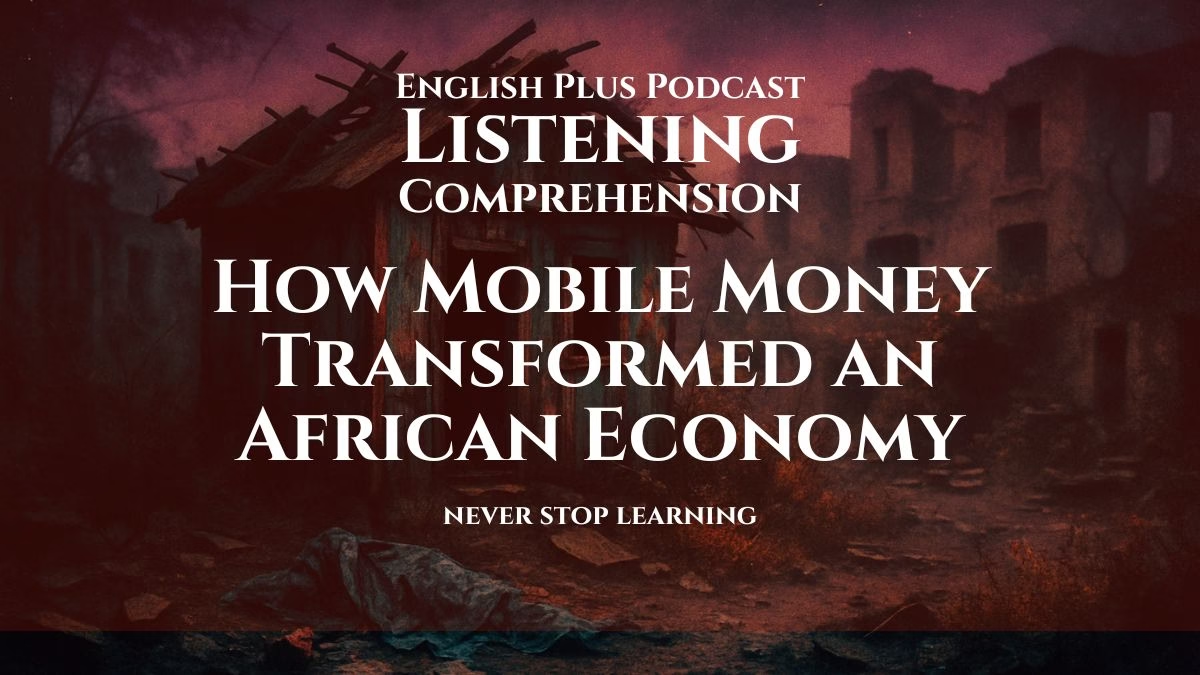A Guide to Effective Listening
Hello! This listening exercise will challenge you to understand a detailed lecture, a common task in academic and professional settings, as well as on exams like the TOEFL. To succeed, you need to listen not just for words, but for ideas. Here are some strategies to help you:
- Listen for Structure: Academic lectures are rarely random. They have an introduction, a body with main points, and a conclusion. Listen for signposting language like, “First, let’s look at…”, “Another key aspect is…”, or “In conclusion…”. Noting down these main points creates a mental outline that helps you organize the details.
- Identify the ‘Why’: Don’t just hear what the speaker says; ask yourself why they are saying it. Are they providing an example? Contrasting two ideas? Explaining a cause-and-effect relationship? Understanding the speaker’s purpose for each piece of information is a hallmark of advanced comprehension.
- Don’t Get Stuck: You will almost certainly hear a word or a phrase you don’t know. Don’t panic and lose focus! Try to understand the general meaning from the context. Often, the main idea is repeated or explained in a different way later. Keep listening for the big picture.
Listening Topic: How Mobile Money Transformed an African Economy
You are about to listen to a lecture on a fascinating economic and technological revolution that started in Kenya. The topic is mobile money. Before you listen, think about this: What challenges might people face in a country where very few have bank accounts but many have a mobile phone? This lecture will explain how a simple idea connected those two realities and changed a nation.
Key Words and Phrases
Getting familiar with these terms from the lecture will help you understand the core concepts.
- Unbanked: This is an adjective used to describe people who do not have an account with a traditional bank or financial institution. The lecture explains that the vast majority of Kenyans were unbanked before the innovation of mobile money.
- Legacy systems: This phrase refers to old methods, technology, or computer systems that are still in use. We use it to describe the traditional banking infrastructure—with its physical branches and paperwork—that was inaccessible to many people.
- Leapfrog: As a verb, this means to bypass or skip over a stage of development. The lecture explains how Kenya was able to leapfrog over the need for traditional banks and go straight to digital finance.
- Ubiquitous: This adjective describes something that seems to be present everywhere at the same time. You’ll hear it used to describe how common mobile phones had become in Kenya, which was the key to mobile money’s success.
- Nascent: This word means just coming into existence and beginning to display signs of future potential. It’s used to describe the very early, experimental stage of the M-Pesa project.
- De facto: A Latin phrase that means “in fact” or “in practice.” It’s used to describe something that is the actual reality, even if it’s not officially recognized. The lecture says M-Pesa became the de facto national payment system.
- Catalyst: A catalyst is something that causes an important event to happen. In our lecture, the introduction of M-Pesa is described as a powerful catalyst for economic growth and entrepreneurship.
- Frictionless: This describes a process that is smooth, easy, and without obstacles. The goal of M-Pesa was to make sending and receiving money as frictionless as possible.
- Ingenuity: This noun means the quality of being clever, original, and inventive. The lecture highlights the ingenuity of everyday Kenyans who adapted the mobile money system for uses its creators never imagined.
- Formalize: To formalize something is to give it a proper, official, or legal structure. The lecture explains how mobile money helped to formalize the economy by bringing transactions out of the cash-only informal sector and into a recorded system.
Listening Audio
Listening Transcript: Please do not read the transcript before you listen and answer the questions.
Good morning. Today, we’re going to examine one of the most remarkable stories of economic transformation in the 21st century. It’s a story about technology, but not the high-end smartphones or complex apps we might think of. Instead, it’s about the humble feature phone. And it’s a story about finance, but not of Wall Street or the City of London. It begins in the bustling markets and rural villages of Kenya. We’re going to explore how a service called M-Pesa didn’t just create a new product, but fundamentally reshaped an entire nation’s economy.
To understand the impact of M-Pesa, we first have to understand the landscape before its launch in 2007. At the time, Kenya was like many developing nations: a cash-based society. The vast majority of the population was unbanked. For them, the world of finance was a distant concept. Legacy systems of banking, with their requirements for formal addresses, minimum balances, and endless paperwork, were designed for a small, urban, salaried elite. For a farmer in a remote village or a vendor in a Nairobi market, opening a bank account was practically impossible.
This created enormous friction in the economy. Imagine you were a worker in the city wanting to send money home to your family in your rural village. Your only option was to physically transport the cash, often by giving it to a bus driver or a relative who was traveling. This process was slow, unreliable, and dangerous. Robberies were common, and money could take days to arrive. This simple act of transferring value was a major obstacle to economic life.
At the same time, something else was happening: the mobile phone revolution. By the mid-2000s, mobile phones were becoming ubiquitous in Kenya, thanks to the expansion of the mobile network operator, Safaricom. Even in areas without reliable electricity or running water, you could find a simple Nokia phone with a pre-paid SIM card. And this is where our story’s innovation begins.
A team of researchers, initially funded by the UK’s Department for International Development, had an idea. They wanted to see if mobile phones could be used to make the process of repaying microfinance loans more efficient. The initial concept was for a system where loan officers could issue and receive payments electronically. This nascent project was given the name M-Pesa. ‘M’ stands for mobile, and ‘Pesa’ is the Swahili word for money.
The pilot program was launched, and the system worked. But the researchers and Safaricom quickly noticed something fascinating. Users were not just using the system to interact with the loan officers. They were using it to send small amounts of money to each other. They had, on their own, discovered the system’s true potential. The real demand wasn’t for a better way to repay loans; it was for a better way to send money home. This displayed a remarkable local ingenuity, adapting a tool for a purpose far more powerful than its original design.
Safaricom made a brilliant strategic pivot. They shifted the focus of M-Pesa from a niche microfinance tool to a mass-market money transfer service. The system they built was elegantly simple. It didn’t require a smartphone or an internet connection. It worked via SMS, the text messaging service available on every mobile phone. To put money into the system, a user would go to a local M-Pesa agent—often a small corner shop or a kiosk selling airtime—and hand over their cash. The agent would credit their M-Pesa account electronically. That virtual money could then be sent to any other phone number in the country with a simple text message. The recipient would receive a notification and could then go to their own local agent to withdraw the cash.
This network of agents was the key. Safaricom built a vast network that reached into the most remote corners of the country. Suddenly, a financial service point was never more than a short walk away. This created a truly frictionless way to move money. The dangerous, slow bus journeys were replaced by an instant, secure, digital transfer.
The uptake was explosive. Within three years of its launch, over 10 million Kenyans—nearly half the adult population at the time—were using M-Pesa. It became the de facto national payment system. People used it for everything: paying for groceries, settling utility bills, and, of course, sending money to relatives.
The economic impact was profound. First, it acted as a massive catalyst for small businesses. A market vendor could now accept digital payments, eliminating the risk of handling cash. A fisherman could sell his catch to a buyer in another town and receive payment instantly, before the fish was even loaded onto the truck. This dramatically increased the speed and security of commerce.
Second, it empowered individuals, especially women. In many households, women were responsible for managing the family budget but had little control over finances. M-Pesa gave them a secure way to save and control money, away from the immediate demands of the household. Studies have shown a direct link between M-Pesa’s adoption and a reduction in poverty, particularly in households headed by women.
Third, M-Pesa helped to formalize the informal economy. Billions of shillings were now flowing through a recorded, digital system instead of as untraceable cash. This allowed for better data on economic activity and eventually paved the way for more sophisticated financial products, like credit and insurance, to be offered via the mobile platform. Kenya was able to leapfrog over the 20th-century model of branch-based banking and create a digital financial ecosystem from the ground up.
The story of M-Pesa is a powerful lesson. It shows that innovation doesn’t always come from the most technologically advanced places. It often comes from a deep understanding of a local problem and the creative application of existing, accessible technology. It demonstrated that by providing the right tools, you can unlock the entrepreneurial potential of millions of people who were previously excluded from the formal economy. It wasn’t just about sending money; it was about sending opportunity.










0 Comments